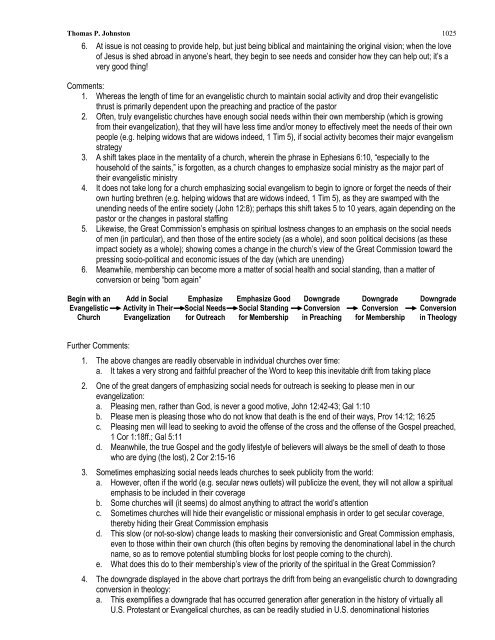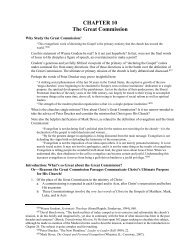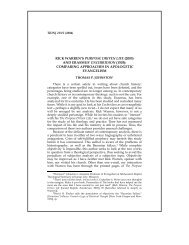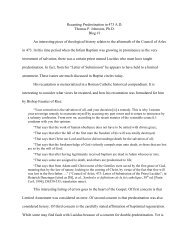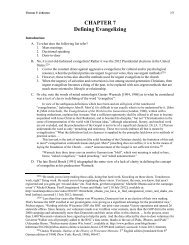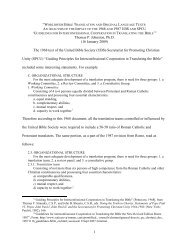Four Categories of Evangelism Programs - Evangelism Unlimited
Four Categories of Evangelism Programs - Evangelism Unlimited
Four Categories of Evangelism Programs - Evangelism Unlimited
Create successful ePaper yourself
Turn your PDF publications into a flip-book with our unique Google optimized e-Paper software.
Thomas P. Johnston 1025<br />
6. At issue is not ceasing to provide help, but just being biblical and maintaining the original vision; when the love<br />
<strong>of</strong> Jesus is shed abroad in anyone’s heart, they begin to see needs and consider how they can help out; it’s a<br />
very good thing!<br />
Comments:<br />
1. Whereas the length <strong>of</strong> time for an evangelistic church to maintain social activity and drop their evangelistic<br />
thrust is primarily dependent upon the preaching and practice <strong>of</strong> the pastor<br />
2. Often, truly evangelistic churches have enough social needs within their own membership (which is growing<br />
from their evangelization), that they will have less time and/or money to effectively meet the needs <strong>of</strong> their own<br />
people (e.g. helping widows that are widows indeed, 1 Tim 5), if social activity becomes their major evangelism<br />
strategy<br />
3. A shift takes place in the mentality <strong>of</strong> a church, wherein the phrase in Ephesians 6:10, “especially to the<br />
household <strong>of</strong> the saints,” is forgotten, as a church changes to emphasize social ministry as the major part <strong>of</strong><br />
their evangelistic ministry<br />
4. It does not take long for a church emphasizing social evangelism to begin to ignore or forget the needs <strong>of</strong> their<br />
own hurting brethren (e.g. helping widows that are widows indeed, 1 Tim 5), as they are swamped with the<br />
unending needs <strong>of</strong> the entire society (John 12:8); perhaps this shift takes 5 to 10 years, again depending on the<br />
pastor or the changes in pastoral staffing<br />
5. Likewise, the Great Commission’s emphasis on spiritual lostness changes to an emphasis on the social needs<br />
<strong>of</strong> men (in particular), and then those <strong>of</strong> the entire society (as a whole), and soon political decisions (as these<br />
impact society as a whole); showing comes a change in the church’s view <strong>of</strong> the Great Commission toward the<br />
pressing socio-political and economic issues <strong>of</strong> the day (which are unending)<br />
6. Meanwhile, membership can become more a matter <strong>of</strong> social health and social standing, than a matter <strong>of</strong><br />
conversion or being “born again”<br />
Begin with an Add in Social Emphasize Emphasize Good Downgrade Downgrade Downgrade<br />
Evangelistic Activity in Their Social Needs Social Standing Conversion Conversion Conversion<br />
Church Evangelization for Outreach for Membership in Preaching for Membership in Theology<br />
Further Comments:<br />
1. The above changes are readily observable in individual churches over time:<br />
a. It takes a very strong and faithful preacher <strong>of</strong> the Word to keep this inevitable drift from taking place<br />
2. One <strong>of</strong> the great dangers <strong>of</strong> emphasizing social needs for outreach is seeking to please men in our<br />
evangelization:<br />
a. Pleasing men, rather than God, is never a good motive, John 12:42-43; Gal 1:10<br />
b. Please men is pleasing those who do not know that death is the end <strong>of</strong> their ways, Prov 14:12; 16:25<br />
c. Pleasing men will lead to seeking to avoid the <strong>of</strong>fense <strong>of</strong> the cross and the <strong>of</strong>fense <strong>of</strong> the Gospel preached,<br />
1 Cor 1:18ff.; Gal 5:11<br />
d. Meanwhile, the true Gospel and the godly lifestyle <strong>of</strong> believers will always be the smell <strong>of</strong> death to those<br />
who are dying (the lost), 2 Cor 2:15-16<br />
3. Sometimes emphasizing social needs leads churches to seek publicity from the world:<br />
a. However, <strong>of</strong>ten if the world (e.g. secular news outlets) will publicize the event, they will not allow a spiritual<br />
emphasis to be included in their coverage<br />
b. Some churches will (it seems) do almost anything to attract the world’s attention<br />
c. Sometimes churches will hide their evangelistic or missional emphasis in order to get secular coverage,<br />
thereby hiding their Great Commission emphasis<br />
d. This slow (or not-so-slow) change leads to masking their conversionistic and Great Commission emphasis,<br />
even to those within their own church (this <strong>of</strong>ten begins by removing the denominational label in the church<br />
name, so as to remove potential stumbling blocks for lost people coming to the church).<br />
e. What does this do to their membership’s view <strong>of</strong> the priority <strong>of</strong> the spiritual in the Great Commission?<br />
4. The downgrade displayed in the above chart portrays the drift from being an evangelistic church to downgrading<br />
conversion in theology:<br />
a. This exemplifies a downgrade that has occurred generation after generation in the history <strong>of</strong> virtually all<br />
U.S. Protestant or Evangelical churches, as can be readily studied in U.S. denominational histories


